Griffith University 1806NRS Essay: Effective Communication in Nursing
VerifiedAdded on 2022/09/08
|9
|2576
|11
Essay
AI Summary
This essay, written for the 1806NRS Communicating Effectively course at Griffith University, explores the critical role of effective communication in nursing practice. It begins by emphasizing the importance of communication for Registered Nurses (RNs) in healthcare settings, highlighting its impact on patient outcomes and the nurse-patient relationship. The essay then delves into three effective verbal communication strategies, such as asking questions, premeditating, and repetition, that RNs can employ to foster therapeutic relationships. Furthermore, it examines two non-verbal communication behaviors that can act as barriers to effective communication, such as expressions and position, and their potential for misinterpretation. The author concludes that effective communication is essential for providing high-quality patient care and building trust, advocating for the use of appropriate communication strategies and the avoidance of communication barriers in nursing practice, referencing multiple scholarly articles to support the arguments.
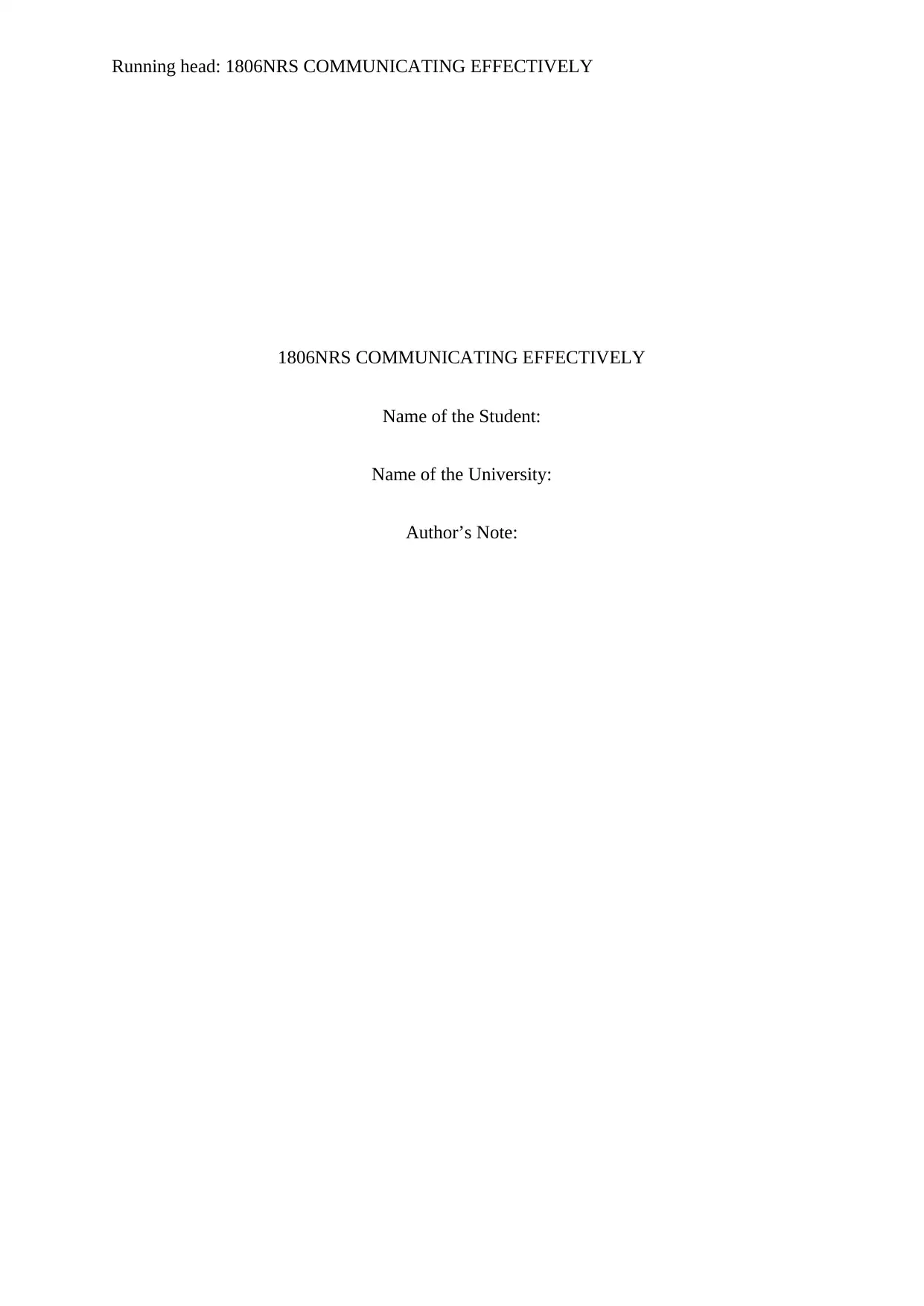
Running head: 1806NRS COMMUNICATING EFFECTIVELY
1806NRS COMMUNICATING EFFECTIVELY
Name of the Student:
Name of the University:
Author’s Note:
1806NRS COMMUNICATING EFFECTIVELY
Name of the Student:
Name of the University:
Author’s Note:
Paraphrase This Document
Need a fresh take? Get an instant paraphrase of this document with our AI Paraphraser
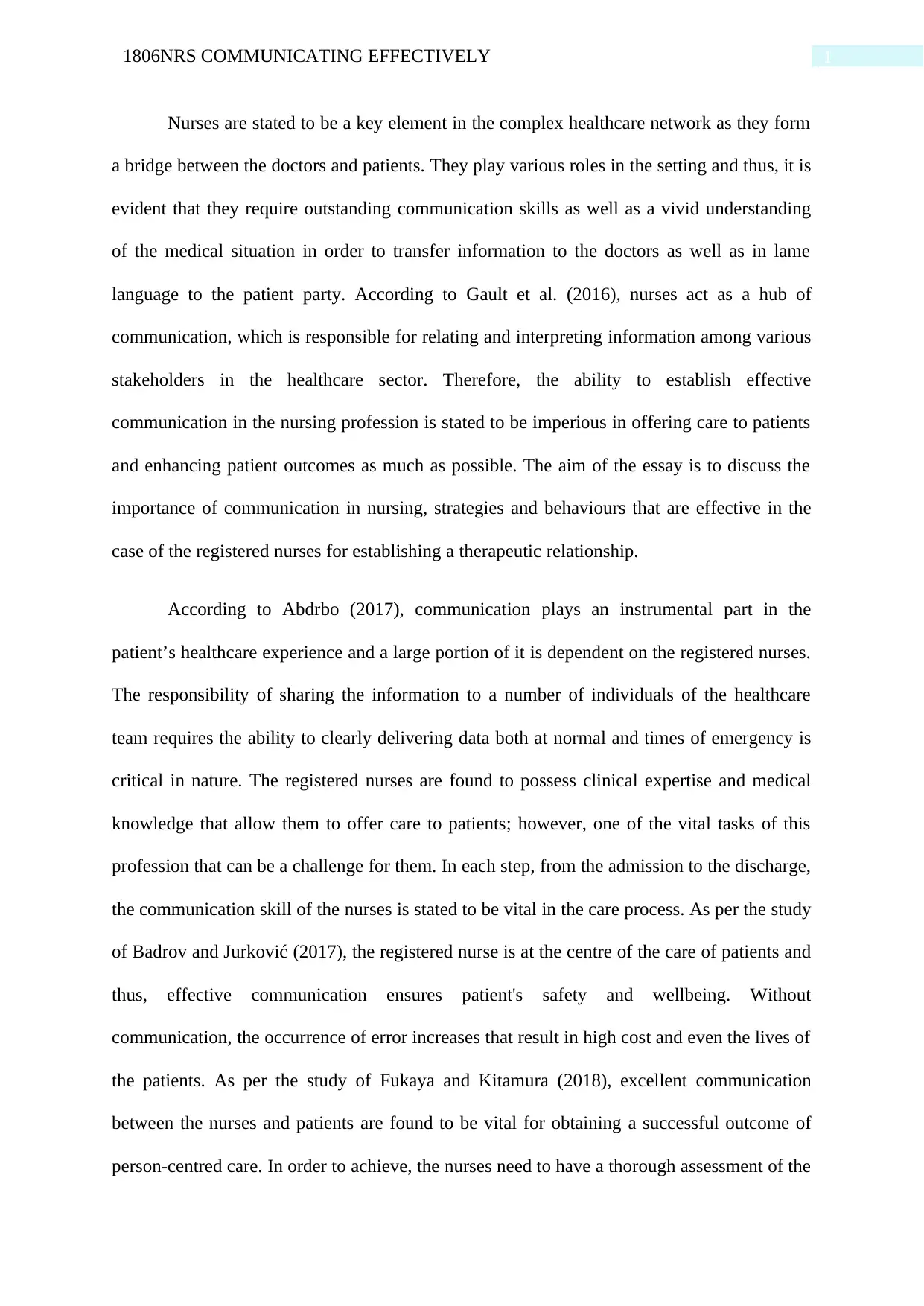
11806NRS COMMUNICATING EFFECTIVELY
Nurses are stated to be a key element in the complex healthcare network as they form
a bridge between the doctors and patients. They play various roles in the setting and thus, it is
evident that they require outstanding communication skills as well as a vivid understanding
of the medical situation in order to transfer information to the doctors as well as in lame
language to the patient party. According to Gault et al. (2016), nurses act as a hub of
communication, which is responsible for relating and interpreting information among various
stakeholders in the healthcare sector. Therefore, the ability to establish effective
communication in the nursing profession is stated to be imperious in offering care to patients
and enhancing patient outcomes as much as possible. The aim of the essay is to discuss the
importance of communication in nursing, strategies and behaviours that are effective in the
case of the registered nurses for establishing a therapeutic relationship.
According to Abdrbo (2017), communication plays an instrumental part in the
patient’s healthcare experience and a large portion of it is dependent on the registered nurses.
The responsibility of sharing the information to a number of individuals of the healthcare
team requires the ability to clearly delivering data both at normal and times of emergency is
critical in nature. The registered nurses are found to possess clinical expertise and medical
knowledge that allow them to offer care to patients; however, one of the vital tasks of this
profession that can be a challenge for them. In each step, from the admission to the discharge,
the communication skill of the nurses is stated to be vital in the care process. As per the study
of Badrov and Jurković (2017), the registered nurse is at the centre of the care of patients and
thus, effective communication ensures patient's safety and wellbeing. Without
communication, the occurrence of error increases that result in high cost and even the lives of
the patients. As per the study of Fukaya and Kitamura (2018), excellent communication
between the nurses and patients are found to be vital for obtaining a successful outcome of
person-centred care. In order to achieve, the nurses need to have a thorough assessment of the
Nurses are stated to be a key element in the complex healthcare network as they form
a bridge between the doctors and patients. They play various roles in the setting and thus, it is
evident that they require outstanding communication skills as well as a vivid understanding
of the medical situation in order to transfer information to the doctors as well as in lame
language to the patient party. According to Gault et al. (2016), nurses act as a hub of
communication, which is responsible for relating and interpreting information among various
stakeholders in the healthcare sector. Therefore, the ability to establish effective
communication in the nursing profession is stated to be imperious in offering care to patients
and enhancing patient outcomes as much as possible. The aim of the essay is to discuss the
importance of communication in nursing, strategies and behaviours that are effective in the
case of the registered nurses for establishing a therapeutic relationship.
According to Abdrbo (2017), communication plays an instrumental part in the
patient’s healthcare experience and a large portion of it is dependent on the registered nurses.
The responsibility of sharing the information to a number of individuals of the healthcare
team requires the ability to clearly delivering data both at normal and times of emergency is
critical in nature. The registered nurses are found to possess clinical expertise and medical
knowledge that allow them to offer care to patients; however, one of the vital tasks of this
profession that can be a challenge for them. In each step, from the admission to the discharge,
the communication skill of the nurses is stated to be vital in the care process. As per the study
of Badrov and Jurković (2017), the registered nurse is at the centre of the care of patients and
thus, effective communication ensures patient's safety and wellbeing. Without
communication, the occurrence of error increases that result in high cost and even the lives of
the patients. As per the study of Fukaya and Kitamura (2018), excellent communication
between the nurses and patients are found to be vital for obtaining a successful outcome of
person-centred care. In order to achieve, the nurses need to have a thorough assessment of the
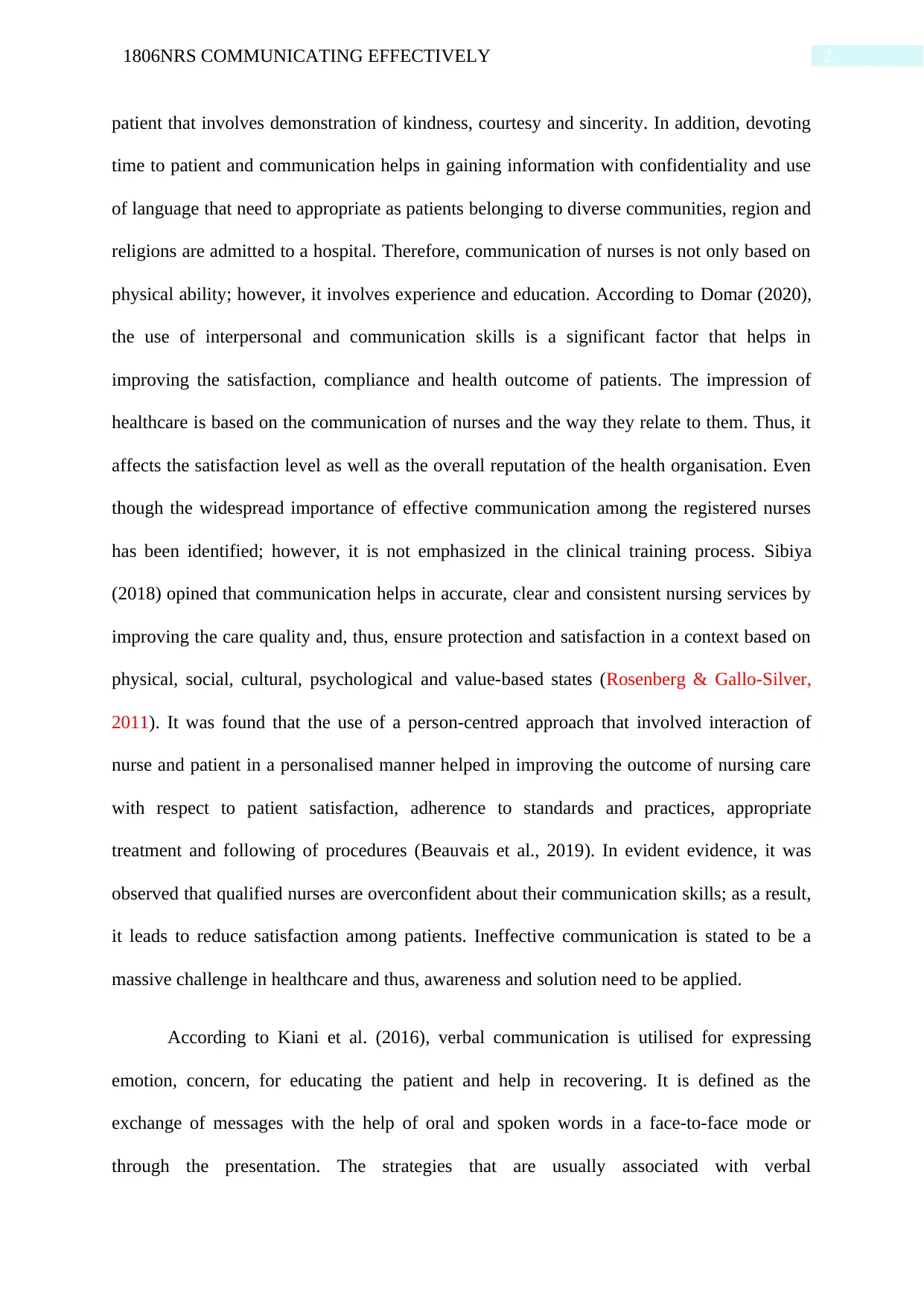
21806NRS COMMUNICATING EFFECTIVELY
patient that involves demonstration of kindness, courtesy and sincerity. In addition, devoting
time to patient and communication helps in gaining information with confidentiality and use
of language that need to appropriate as patients belonging to diverse communities, region and
religions are admitted to a hospital. Therefore, communication of nurses is not only based on
physical ability; however, it involves experience and education. According to Domar (2020),
the use of interpersonal and communication skills is a significant factor that helps in
improving the satisfaction, compliance and health outcome of patients. The impression of
healthcare is based on the communication of nurses and the way they relate to them. Thus, it
affects the satisfaction level as well as the overall reputation of the health organisation. Even
though the widespread importance of effective communication among the registered nurses
has been identified; however, it is not emphasized in the clinical training process. Sibiya
(2018) opined that communication helps in accurate, clear and consistent nursing services by
improving the care quality and, thus, ensure protection and satisfaction in a context based on
physical, social, cultural, psychological and value-based states (Rosenberg & Gallo-Silver,
2011). It was found that the use of a person-centred approach that involved interaction of
nurse and patient in a personalised manner helped in improving the outcome of nursing care
with respect to patient satisfaction, adherence to standards and practices, appropriate
treatment and following of procedures (Beauvais et al., 2019). In evident evidence, it was
observed that qualified nurses are overconfident about their communication skills; as a result,
it leads to reduce satisfaction among patients. Ineffective communication is stated to be a
massive challenge in healthcare and thus, awareness and solution need to be applied.
According to Kiani et al. (2016), verbal communication is utilised for expressing
emotion, concern, for educating the patient and help in recovering. It is defined as the
exchange of messages with the help of oral and spoken words in a face-to-face mode or
through the presentation. The strategies that are usually associated with verbal
patient that involves demonstration of kindness, courtesy and sincerity. In addition, devoting
time to patient and communication helps in gaining information with confidentiality and use
of language that need to appropriate as patients belonging to diverse communities, region and
religions are admitted to a hospital. Therefore, communication of nurses is not only based on
physical ability; however, it involves experience and education. According to Domar (2020),
the use of interpersonal and communication skills is a significant factor that helps in
improving the satisfaction, compliance and health outcome of patients. The impression of
healthcare is based on the communication of nurses and the way they relate to them. Thus, it
affects the satisfaction level as well as the overall reputation of the health organisation. Even
though the widespread importance of effective communication among the registered nurses
has been identified; however, it is not emphasized in the clinical training process. Sibiya
(2018) opined that communication helps in accurate, clear and consistent nursing services by
improving the care quality and, thus, ensure protection and satisfaction in a context based on
physical, social, cultural, psychological and value-based states (Rosenberg & Gallo-Silver,
2011). It was found that the use of a person-centred approach that involved interaction of
nurse and patient in a personalised manner helped in improving the outcome of nursing care
with respect to patient satisfaction, adherence to standards and practices, appropriate
treatment and following of procedures (Beauvais et al., 2019). In evident evidence, it was
observed that qualified nurses are overconfident about their communication skills; as a result,
it leads to reduce satisfaction among patients. Ineffective communication is stated to be a
massive challenge in healthcare and thus, awareness and solution need to be applied.
According to Kiani et al. (2016), verbal communication is utilised for expressing
emotion, concern, for educating the patient and help in recovering. It is defined as the
exchange of messages with the help of oral and spoken words in a face-to-face mode or
through the presentation. The strategies that are usually associated with verbal
⊘ This is a preview!⊘
Do you want full access?
Subscribe today to unlock all pages.

Trusted by 1+ million students worldwide
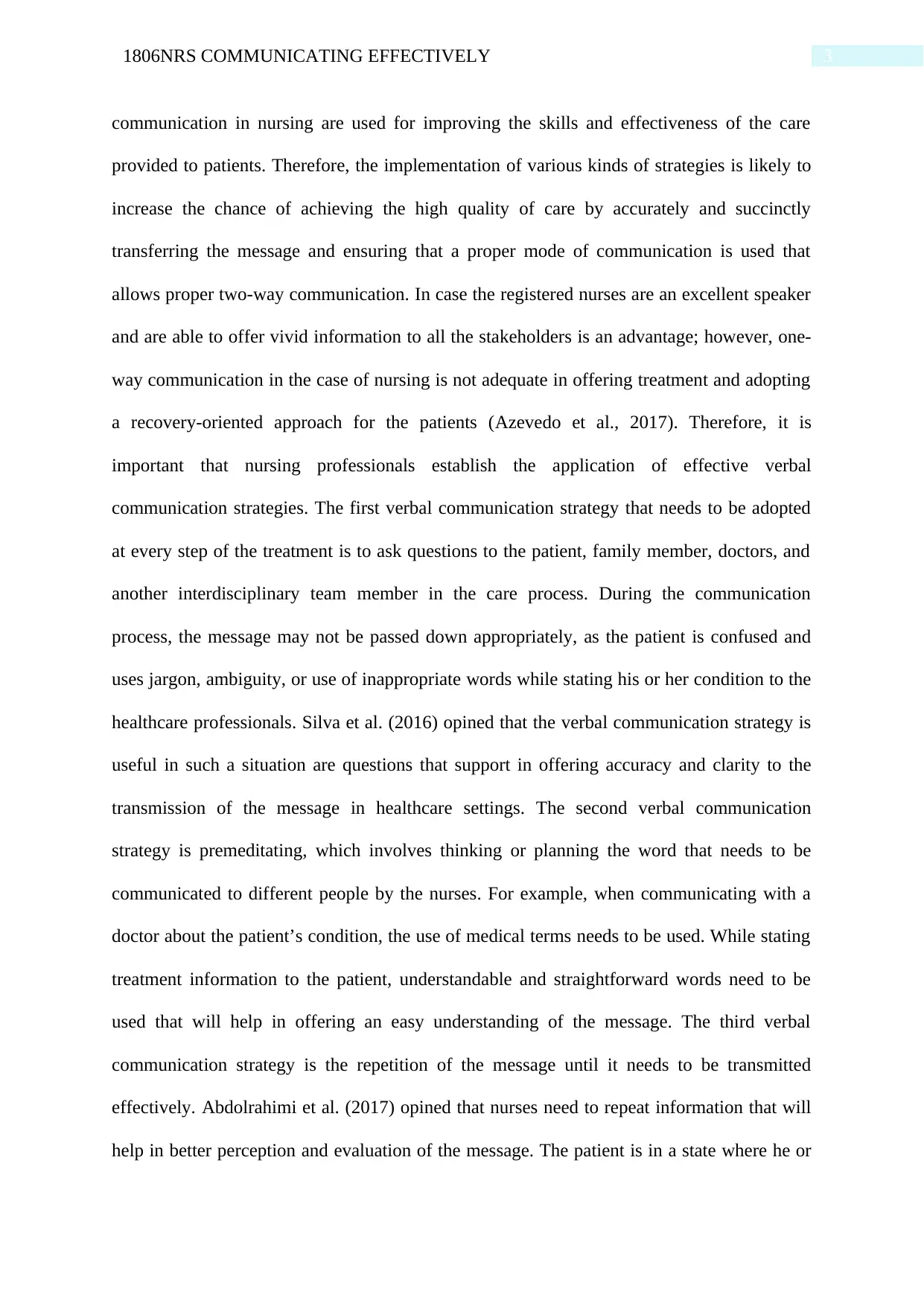
31806NRS COMMUNICATING EFFECTIVELY
communication in nursing are used for improving the skills and effectiveness of the care
provided to patients. Therefore, the implementation of various kinds of strategies is likely to
increase the chance of achieving the high quality of care by accurately and succinctly
transferring the message and ensuring that a proper mode of communication is used that
allows proper two-way communication. In case the registered nurses are an excellent speaker
and are able to offer vivid information to all the stakeholders is an advantage; however, one-
way communication in the case of nursing is not adequate in offering treatment and adopting
a recovery-oriented approach for the patients (Azevedo et al., 2017). Therefore, it is
important that nursing professionals establish the application of effective verbal
communication strategies. The first verbal communication strategy that needs to be adopted
at every step of the treatment is to ask questions to the patient, family member, doctors, and
another interdisciplinary team member in the care process. During the communication
process, the message may not be passed down appropriately, as the patient is confused and
uses jargon, ambiguity, or use of inappropriate words while stating his or her condition to the
healthcare professionals. Silva et al. (2016) opined that the verbal communication strategy is
useful in such a situation are questions that support in offering accuracy and clarity to the
transmission of the message in healthcare settings. The second verbal communication
strategy is premeditating, which involves thinking or planning the word that needs to be
communicated to different people by the nurses. For example, when communicating with a
doctor about the patient’s condition, the use of medical terms needs to be used. While stating
treatment information to the patient, understandable and straightforward words need to be
used that will help in offering an easy understanding of the message. The third verbal
communication strategy is the repetition of the message until it needs to be transmitted
effectively. Abdolrahimi et al. (2017) opined that nurses need to repeat information that will
help in better perception and evaluation of the message. The patient is in a state where he or
communication in nursing are used for improving the skills and effectiveness of the care
provided to patients. Therefore, the implementation of various kinds of strategies is likely to
increase the chance of achieving the high quality of care by accurately and succinctly
transferring the message and ensuring that a proper mode of communication is used that
allows proper two-way communication. In case the registered nurses are an excellent speaker
and are able to offer vivid information to all the stakeholders is an advantage; however, one-
way communication in the case of nursing is not adequate in offering treatment and adopting
a recovery-oriented approach for the patients (Azevedo et al., 2017). Therefore, it is
important that nursing professionals establish the application of effective verbal
communication strategies. The first verbal communication strategy that needs to be adopted
at every step of the treatment is to ask questions to the patient, family member, doctors, and
another interdisciplinary team member in the care process. During the communication
process, the message may not be passed down appropriately, as the patient is confused and
uses jargon, ambiguity, or use of inappropriate words while stating his or her condition to the
healthcare professionals. Silva et al. (2016) opined that the verbal communication strategy is
useful in such a situation are questions that support in offering accuracy and clarity to the
transmission of the message in healthcare settings. The second verbal communication
strategy is premeditating, which involves thinking or planning the word that needs to be
communicated to different people by the nurses. For example, when communicating with a
doctor about the patient’s condition, the use of medical terms needs to be used. While stating
treatment information to the patient, understandable and straightforward words need to be
used that will help in offering an easy understanding of the message. The third verbal
communication strategy is the repetition of the message until it needs to be transmitted
effectively. Abdolrahimi et al. (2017) opined that nurses need to repeat information that will
help in better perception and evaluation of the message. The patient is in a state where he or
Paraphrase This Document
Need a fresh take? Get an instant paraphrase of this document with our AI Paraphraser
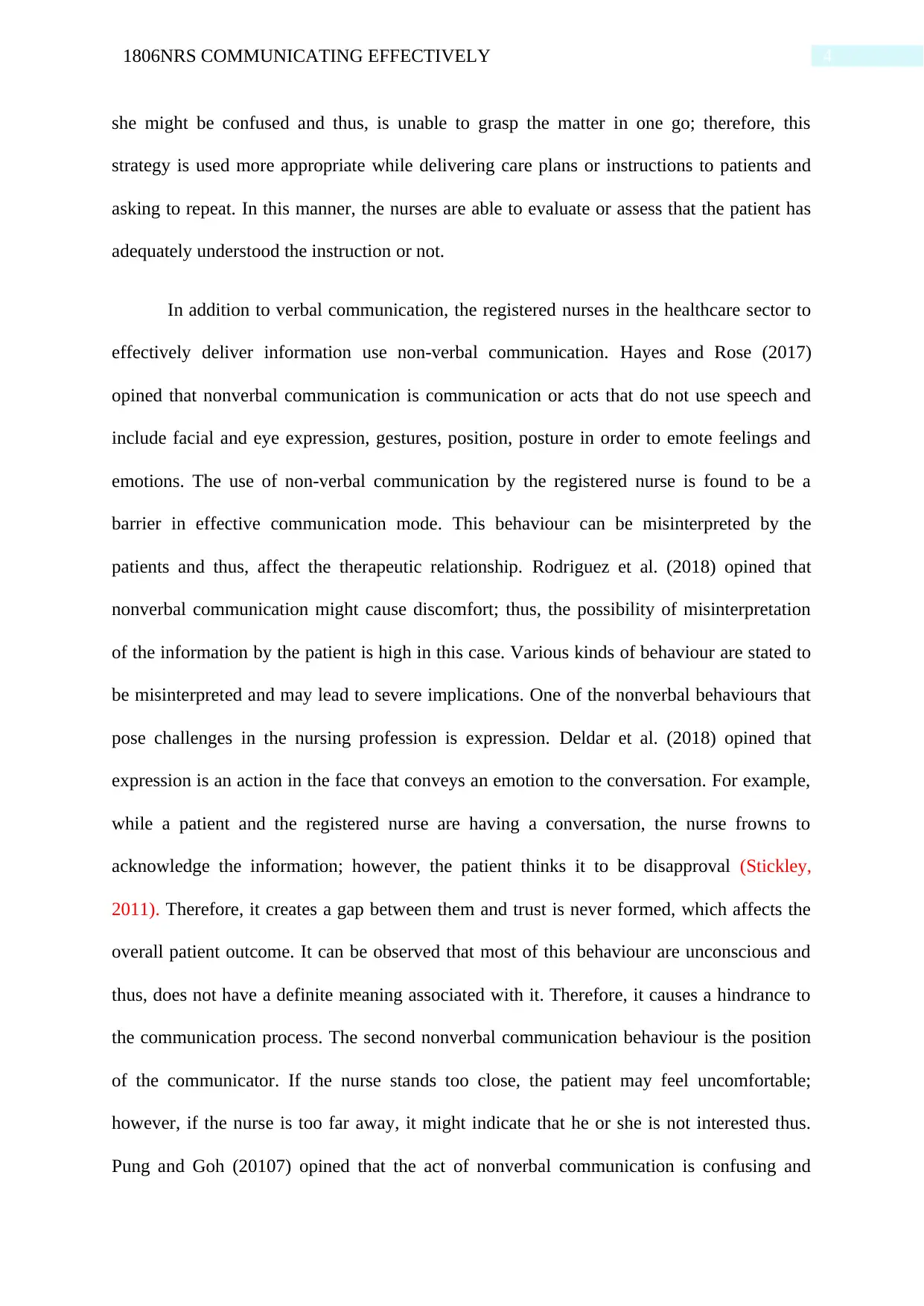
41806NRS COMMUNICATING EFFECTIVELY
she might be confused and thus, is unable to grasp the matter in one go; therefore, this
strategy is used more appropriate while delivering care plans or instructions to patients and
asking to repeat. In this manner, the nurses are able to evaluate or assess that the patient has
adequately understood the instruction or not.
In addition to verbal communication, the registered nurses in the healthcare sector to
effectively deliver information use non-verbal communication. Hayes and Rose (2017)
opined that nonverbal communication is communication or acts that do not use speech and
include facial and eye expression, gestures, position, posture in order to emote feelings and
emotions. The use of non-verbal communication by the registered nurse is found to be a
barrier in effective communication mode. This behaviour can be misinterpreted by the
patients and thus, affect the therapeutic relationship. Rodriguez et al. (2018) opined that
nonverbal communication might cause discomfort; thus, the possibility of misinterpretation
of the information by the patient is high in this case. Various kinds of behaviour are stated to
be misinterpreted and may lead to severe implications. One of the nonverbal behaviours that
pose challenges in the nursing profession is expression. Deldar et al. (2018) opined that
expression is an action in the face that conveys an emotion to the conversation. For example,
while a patient and the registered nurse are having a conversation, the nurse frowns to
acknowledge the information; however, the patient thinks it to be disapproval (Stickley,
2011). Therefore, it creates a gap between them and trust is never formed, which affects the
overall patient outcome. It can be observed that most of this behaviour are unconscious and
thus, does not have a definite meaning associated with it. Therefore, it causes a hindrance to
the communication process. The second nonverbal communication behaviour is the position
of the communicator. If the nurse stands too close, the patient may feel uncomfortable;
however, if the nurse is too far away, it might indicate that he or she is not interested thus.
Pung and Goh (20107) opined that the act of nonverbal communication is confusing and
she might be confused and thus, is unable to grasp the matter in one go; therefore, this
strategy is used more appropriate while delivering care plans or instructions to patients and
asking to repeat. In this manner, the nurses are able to evaluate or assess that the patient has
adequately understood the instruction or not.
In addition to verbal communication, the registered nurses in the healthcare sector to
effectively deliver information use non-verbal communication. Hayes and Rose (2017)
opined that nonverbal communication is communication or acts that do not use speech and
include facial and eye expression, gestures, position, posture in order to emote feelings and
emotions. The use of non-verbal communication by the registered nurse is found to be a
barrier in effective communication mode. This behaviour can be misinterpreted by the
patients and thus, affect the therapeutic relationship. Rodriguez et al. (2018) opined that
nonverbal communication might cause discomfort; thus, the possibility of misinterpretation
of the information by the patient is high in this case. Various kinds of behaviour are stated to
be misinterpreted and may lead to severe implications. One of the nonverbal behaviours that
pose challenges in the nursing profession is expression. Deldar et al. (2018) opined that
expression is an action in the face that conveys an emotion to the conversation. For example,
while a patient and the registered nurse are having a conversation, the nurse frowns to
acknowledge the information; however, the patient thinks it to be disapproval (Stickley,
2011). Therefore, it creates a gap between them and trust is never formed, which affects the
overall patient outcome. It can be observed that most of this behaviour are unconscious and
thus, does not have a definite meaning associated with it. Therefore, it causes a hindrance to
the communication process. The second nonverbal communication behaviour is the position
of the communicator. If the nurse stands too close, the patient may feel uncomfortable;
however, if the nurse is too far away, it might indicate that he or she is not interested thus.
Pung and Goh (20107) opined that the act of nonverbal communication is confusing and
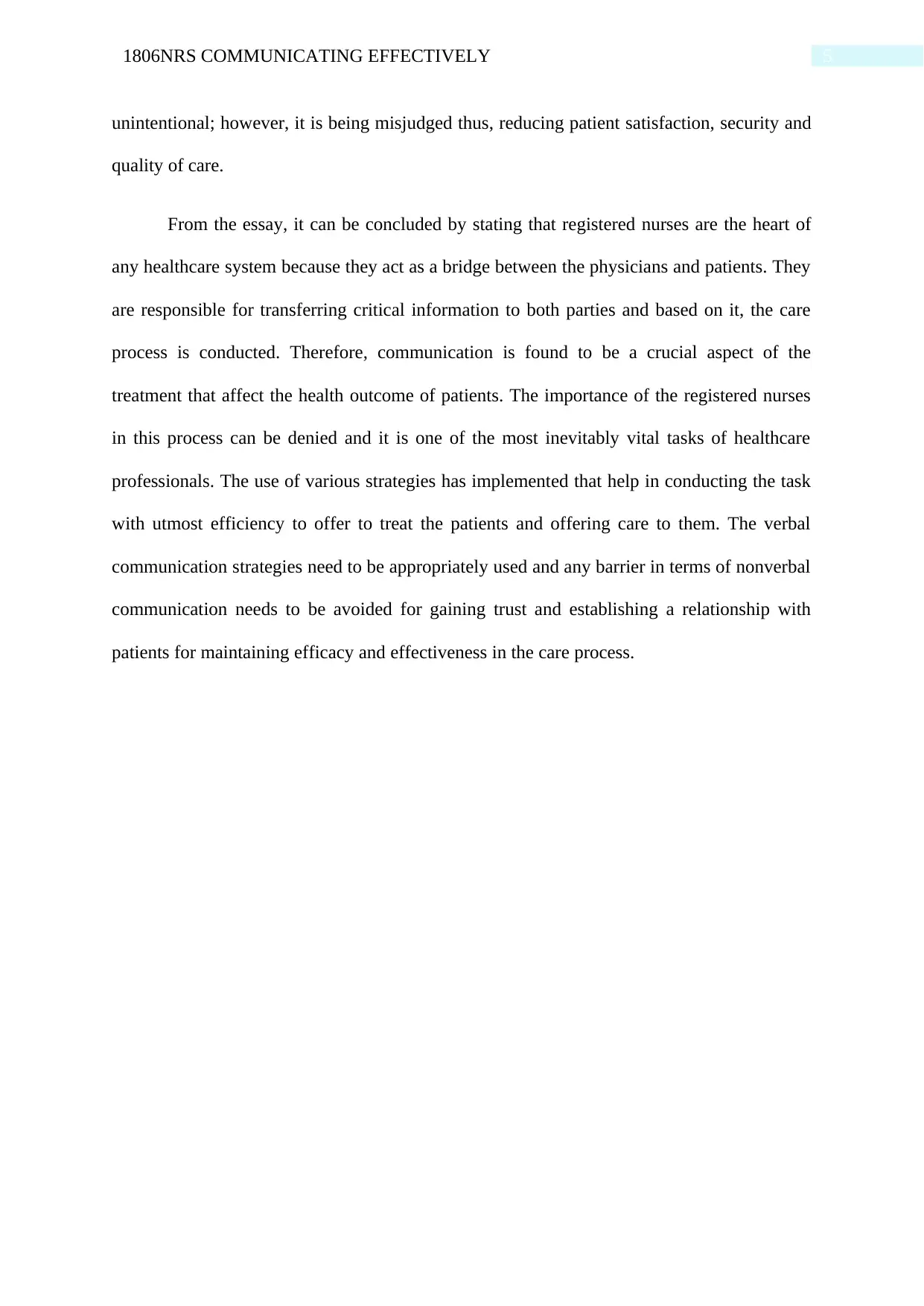
51806NRS COMMUNICATING EFFECTIVELY
unintentional; however, it is being misjudged thus, reducing patient satisfaction, security and
quality of care.
From the essay, it can be concluded by stating that registered nurses are the heart of
any healthcare system because they act as a bridge between the physicians and patients. They
are responsible for transferring critical information to both parties and based on it, the care
process is conducted. Therefore, communication is found to be a crucial aspect of the
treatment that affect the health outcome of patients. The importance of the registered nurses
in this process can be denied and it is one of the most inevitably vital tasks of healthcare
professionals. The use of various strategies has implemented that help in conducting the task
with utmost efficiency to offer to treat the patients and offering care to them. The verbal
communication strategies need to be appropriately used and any barrier in terms of nonverbal
communication needs to be avoided for gaining trust and establishing a relationship with
patients for maintaining efficacy and effectiveness in the care process.
unintentional; however, it is being misjudged thus, reducing patient satisfaction, security and
quality of care.
From the essay, it can be concluded by stating that registered nurses are the heart of
any healthcare system because they act as a bridge between the physicians and patients. They
are responsible for transferring critical information to both parties and based on it, the care
process is conducted. Therefore, communication is found to be a crucial aspect of the
treatment that affect the health outcome of patients. The importance of the registered nurses
in this process can be denied and it is one of the most inevitably vital tasks of healthcare
professionals. The use of various strategies has implemented that help in conducting the task
with utmost efficiency to offer to treat the patients and offering care to them. The verbal
communication strategies need to be appropriately used and any barrier in terms of nonverbal
communication needs to be avoided for gaining trust and establishing a relationship with
patients for maintaining efficacy and effectiveness in the care process.
⊘ This is a preview!⊘
Do you want full access?
Subscribe today to unlock all pages.

Trusted by 1+ million students worldwide
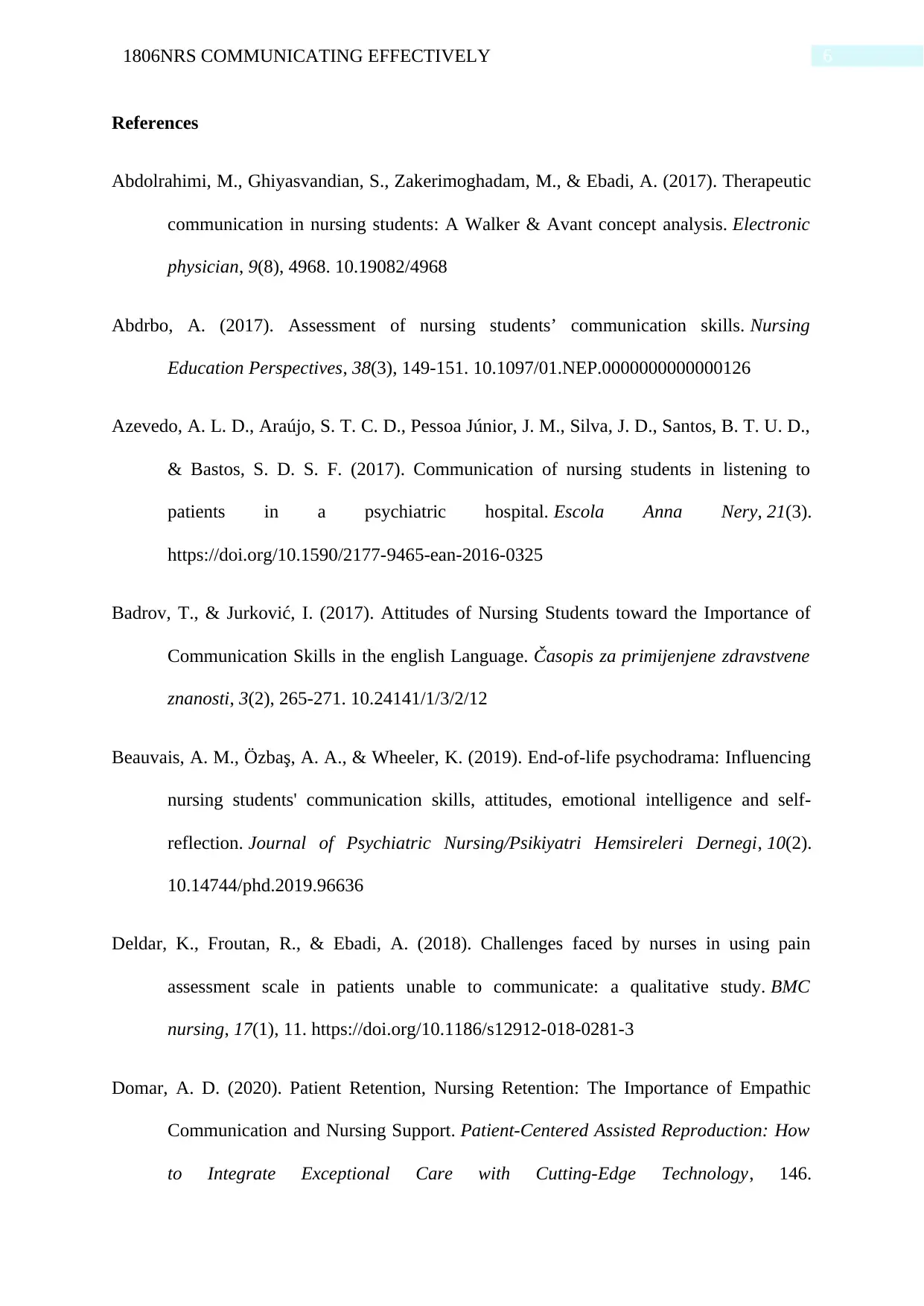
61806NRS COMMUNICATING EFFECTIVELY
References
Abdolrahimi, M., Ghiyasvandian, S., Zakerimoghadam, M., & Ebadi, A. (2017). Therapeutic
communication in nursing students: A Walker & Avant concept analysis. Electronic
physician, 9(8), 4968. 10.19082/4968
Abdrbo, A. (2017). Assessment of nursing students’ communication skills. Nursing
Education Perspectives, 38(3), 149-151. 10.1097/01.NEP.0000000000000126
Azevedo, A. L. D., Araújo, S. T. C. D., Pessoa Júnior, J. M., Silva, J. D., Santos, B. T. U. D.,
& Bastos, S. D. S. F. (2017). Communication of nursing students in listening to
patients in a psychiatric hospital. Escola Anna Nery, 21(3).
https://doi.org/10.1590/2177-9465-ean-2016-0325
Badrov, T., & Jurković, I. (2017). Attitudes of Nursing Students toward the Importance of
Communication Skills in the english Language. Časopis za primijenjene zdravstvene
znanosti, 3(2), 265-271. 10.24141/1/3/2/12
Beauvais, A. M., Özbaş, A. A., & Wheeler, K. (2019). End-of-life psychodrama: Influencing
nursing students' communication skills, attitudes, emotional intelligence and self-
reflection. Journal of Psychiatric Nursing/Psikiyatri Hemsireleri Dernegi, 10(2).
10.14744/phd.2019.96636
Deldar, K., Froutan, R., & Ebadi, A. (2018). Challenges faced by nurses in using pain
assessment scale in patients unable to communicate: a qualitative study. BMC
nursing, 17(1), 11. https://doi.org/10.1186/s12912-018-0281-3
Domar, A. D. (2020). Patient Retention, Nursing Retention: The Importance of Empathic
Communication and Nursing Support. Patient-Centered Assisted Reproduction: How
to Integrate Exceptional Care with Cutting-Edge Technology, 146.
References
Abdolrahimi, M., Ghiyasvandian, S., Zakerimoghadam, M., & Ebadi, A. (2017). Therapeutic
communication in nursing students: A Walker & Avant concept analysis. Electronic
physician, 9(8), 4968. 10.19082/4968
Abdrbo, A. (2017). Assessment of nursing students’ communication skills. Nursing
Education Perspectives, 38(3), 149-151. 10.1097/01.NEP.0000000000000126
Azevedo, A. L. D., Araújo, S. T. C. D., Pessoa Júnior, J. M., Silva, J. D., Santos, B. T. U. D.,
& Bastos, S. D. S. F. (2017). Communication of nursing students in listening to
patients in a psychiatric hospital. Escola Anna Nery, 21(3).
https://doi.org/10.1590/2177-9465-ean-2016-0325
Badrov, T., & Jurković, I. (2017). Attitudes of Nursing Students toward the Importance of
Communication Skills in the english Language. Časopis za primijenjene zdravstvene
znanosti, 3(2), 265-271. 10.24141/1/3/2/12
Beauvais, A. M., Özbaş, A. A., & Wheeler, K. (2019). End-of-life psychodrama: Influencing
nursing students' communication skills, attitudes, emotional intelligence and self-
reflection. Journal of Psychiatric Nursing/Psikiyatri Hemsireleri Dernegi, 10(2).
10.14744/phd.2019.96636
Deldar, K., Froutan, R., & Ebadi, A. (2018). Challenges faced by nurses in using pain
assessment scale in patients unable to communicate: a qualitative study. BMC
nursing, 17(1), 11. https://doi.org/10.1186/s12912-018-0281-3
Domar, A. D. (2020). Patient Retention, Nursing Retention: The Importance of Empathic
Communication and Nursing Support. Patient-Centered Assisted Reproduction: How
to Integrate Exceptional Care with Cutting-Edge Technology, 146.
Paraphrase This Document
Need a fresh take? Get an instant paraphrase of this document with our AI Paraphraser
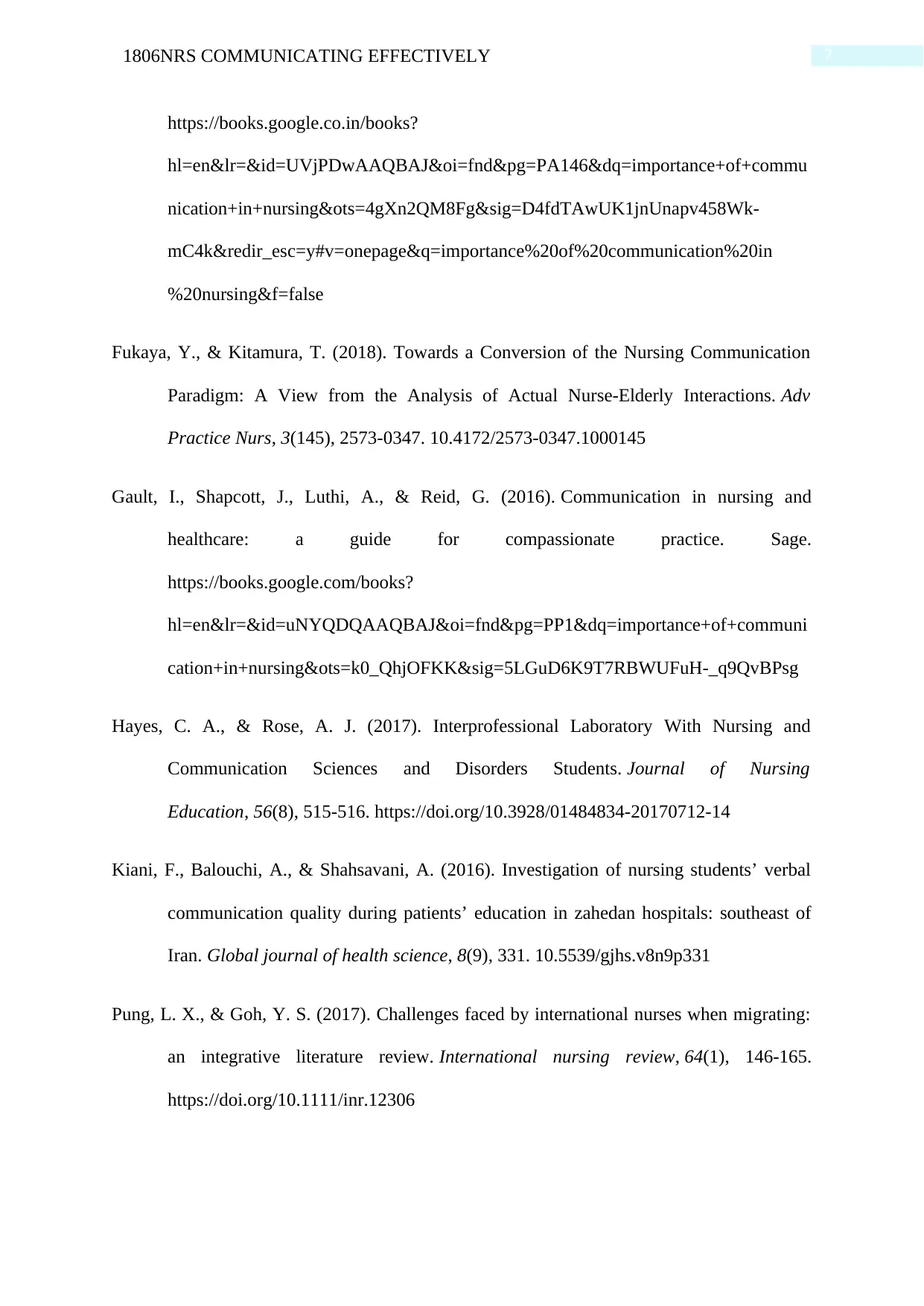
71806NRS COMMUNICATING EFFECTIVELY
https://books.google.co.in/books?
hl=en&lr=&id=UVjPDwAAQBAJ&oi=fnd&pg=PA146&dq=importance+of+commu
nication+in+nursing&ots=4gXn2QM8Fg&sig=D4fdTAwUK1jnUnapv458Wk-
mC4k&redir_esc=y#v=onepage&q=importance%20of%20communication%20in
%20nursing&f=false
Fukaya, Y., & Kitamura, T. (2018). Towards a Conversion of the Nursing Communication
Paradigm: A View from the Analysis of Actual Nurse-Elderly Interactions. Adv
Practice Nurs, 3(145), 2573-0347. 10.4172/2573-0347.1000145
Gault, I., Shapcott, J., Luthi, A., & Reid, G. (2016). Communication in nursing and
healthcare: a guide for compassionate practice. Sage.
https://books.google.com/books?
hl=en&lr=&id=uNYQDQAAQBAJ&oi=fnd&pg=PP1&dq=importance+of+communi
cation+in+nursing&ots=k0_QhjOFKK&sig=5LGuD6K9T7RBWUFuH-_q9QvBPsg
Hayes, C. A., & Rose, A. J. (2017). Interprofessional Laboratory With Nursing and
Communication Sciences and Disorders Students. Journal of Nursing
Education, 56(8), 515-516. https://doi.org/10.3928/01484834-20170712-14
Kiani, F., Balouchi, A., & Shahsavani, A. (2016). Investigation of nursing students’ verbal
communication quality during patients’ education in zahedan hospitals: southeast of
Iran. Global journal of health science, 8(9), 331. 10.5539/gjhs.v8n9p331
Pung, L. X., & Goh, Y. S. (2017). Challenges faced by international nurses when migrating:
an integrative literature review. International nursing review, 64(1), 146-165.
https://doi.org/10.1111/inr.12306
https://books.google.co.in/books?
hl=en&lr=&id=UVjPDwAAQBAJ&oi=fnd&pg=PA146&dq=importance+of+commu
nication+in+nursing&ots=4gXn2QM8Fg&sig=D4fdTAwUK1jnUnapv458Wk-
mC4k&redir_esc=y#v=onepage&q=importance%20of%20communication%20in
%20nursing&f=false
Fukaya, Y., & Kitamura, T. (2018). Towards a Conversion of the Nursing Communication
Paradigm: A View from the Analysis of Actual Nurse-Elderly Interactions. Adv
Practice Nurs, 3(145), 2573-0347. 10.4172/2573-0347.1000145
Gault, I., Shapcott, J., Luthi, A., & Reid, G. (2016). Communication in nursing and
healthcare: a guide for compassionate practice. Sage.
https://books.google.com/books?
hl=en&lr=&id=uNYQDQAAQBAJ&oi=fnd&pg=PP1&dq=importance+of+communi
cation+in+nursing&ots=k0_QhjOFKK&sig=5LGuD6K9T7RBWUFuH-_q9QvBPsg
Hayes, C. A., & Rose, A. J. (2017). Interprofessional Laboratory With Nursing and
Communication Sciences and Disorders Students. Journal of Nursing
Education, 56(8), 515-516. https://doi.org/10.3928/01484834-20170712-14
Kiani, F., Balouchi, A., & Shahsavani, A. (2016). Investigation of nursing students’ verbal
communication quality during patients’ education in zahedan hospitals: southeast of
Iran. Global journal of health science, 8(9), 331. 10.5539/gjhs.v8n9p331
Pung, L. X., & Goh, Y. S. (2017). Challenges faced by international nurses when migrating:
an integrative literature review. International nursing review, 64(1), 146-165.
https://doi.org/10.1111/inr.12306
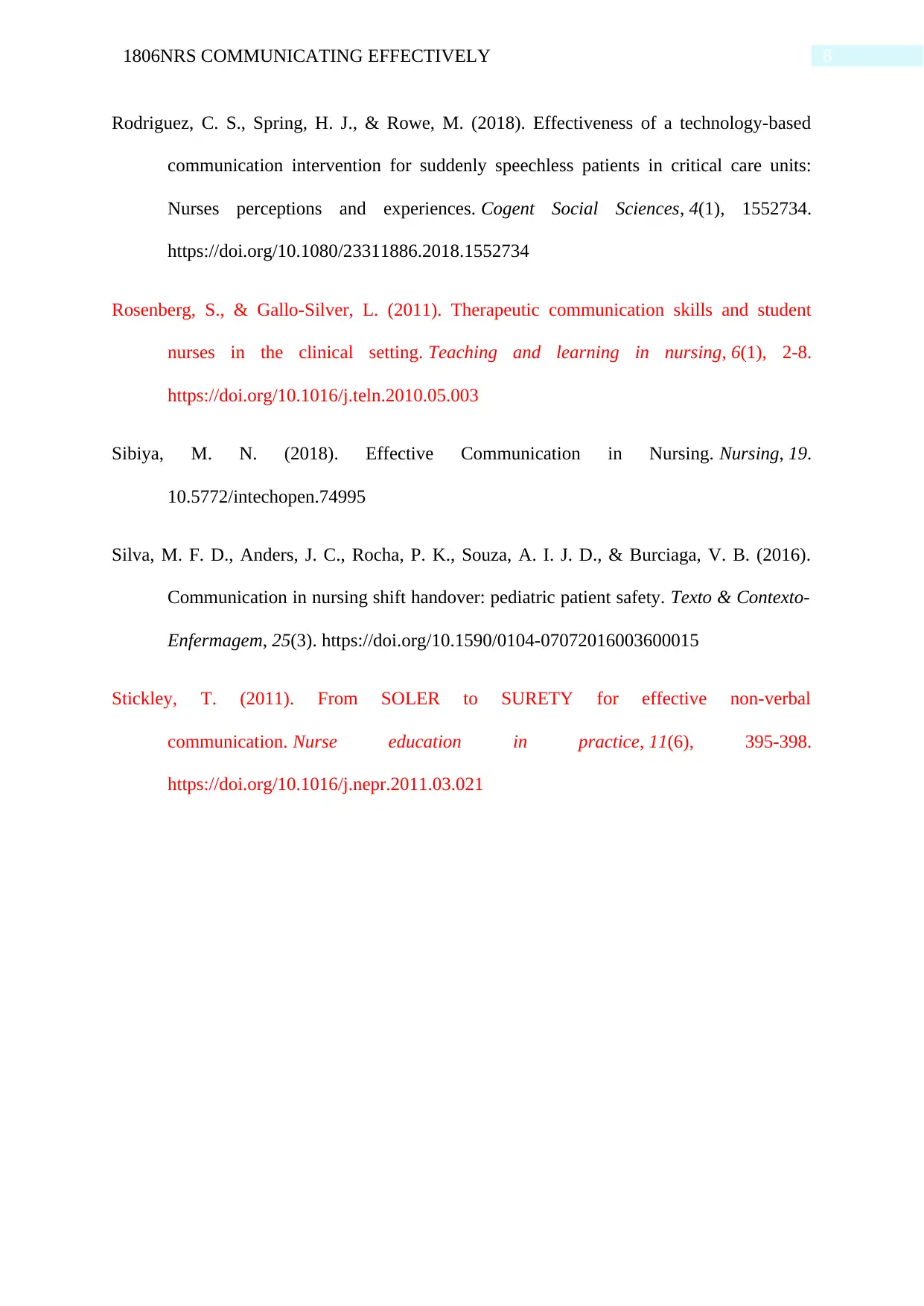
81806NRS COMMUNICATING EFFECTIVELY
Rodriguez, C. S., Spring, H. J., & Rowe, M. (2018). Effectiveness of a technology-based
communication intervention for suddenly speechless patients in critical care units:
Nurses perceptions and experiences. Cogent Social Sciences, 4(1), 1552734.
https://doi.org/10.1080/23311886.2018.1552734
Rosenberg, S., & Gallo-Silver, L. (2011). Therapeutic communication skills and student
nurses in the clinical setting. Teaching and learning in nursing, 6(1), 2-8.
https://doi.org/10.1016/j.teln.2010.05.003
Sibiya, M. N. (2018). Effective Communication in Nursing. Nursing, 19.
10.5772/intechopen.74995
Silva, M. F. D., Anders, J. C., Rocha, P. K., Souza, A. I. J. D., & Burciaga, V. B. (2016).
Communication in nursing shift handover: pediatric patient safety. Texto & Contexto-
Enfermagem, 25(3). https://doi.org/10.1590/0104-07072016003600015
Stickley, T. (2011). From SOLER to SURETY for effective non-verbal
communication. Nurse education in practice, 11(6), 395-398.
https://doi.org/10.1016/j.nepr.2011.03.021
Rodriguez, C. S., Spring, H. J., & Rowe, M. (2018). Effectiveness of a technology-based
communication intervention for suddenly speechless patients in critical care units:
Nurses perceptions and experiences. Cogent Social Sciences, 4(1), 1552734.
https://doi.org/10.1080/23311886.2018.1552734
Rosenberg, S., & Gallo-Silver, L. (2011). Therapeutic communication skills and student
nurses in the clinical setting. Teaching and learning in nursing, 6(1), 2-8.
https://doi.org/10.1016/j.teln.2010.05.003
Sibiya, M. N. (2018). Effective Communication in Nursing. Nursing, 19.
10.5772/intechopen.74995
Silva, M. F. D., Anders, J. C., Rocha, P. K., Souza, A. I. J. D., & Burciaga, V. B. (2016).
Communication in nursing shift handover: pediatric patient safety. Texto & Contexto-
Enfermagem, 25(3). https://doi.org/10.1590/0104-07072016003600015
Stickley, T. (2011). From SOLER to SURETY for effective non-verbal
communication. Nurse education in practice, 11(6), 395-398.
https://doi.org/10.1016/j.nepr.2011.03.021
⊘ This is a preview!⊘
Do you want full access?
Subscribe today to unlock all pages.

Trusted by 1+ million students worldwide
1 out of 9
Related Documents
Your All-in-One AI-Powered Toolkit for Academic Success.
+13062052269
info@desklib.com
Available 24*7 on WhatsApp / Email
![[object Object]](/_next/static/media/star-bottom.7253800d.svg)
Unlock your academic potential
Copyright © 2020–2026 A2Z Services. All Rights Reserved. Developed and managed by ZUCOL.





